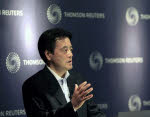Regardless of DPJ aspirations, FTA with US would be tall order
Japan Times | Wednesday, Aug. 12, 2009
Regardless of DPJ aspirations, FTA with U.S. would be tall order

By SHINYA AJIMA
Kyodo News
The media have lashed out at the Democratic Party of Japan over its apparent backpedaling on wanting a free-trade agreement between Japan and the United States.
But experts say that regardless of the party’s aspirations, an FTA between the world’s two biggest economies will never come easily, given not only the expected opposition from Japanese farmers but also the Asia-Pacific "regional structure."
The DPJ, widely expected to win the Lower House election, had said Japan would seek to conclude an FTA as part of its efforts to "establish equal relations of mutual trust" with the United States.
But last week, it suddenly played down parts of its campaign platform, saying a DPJ government would only "promote" efforts to conclude a bilateral agreement among trade deals with other countries.
The flip-flop came after the party faced a backlash from angry farmers who fear an influx of cheaper U.S. food products if trade between the two countries is further liberalized.
Winning the votes of farmers, who are traditionally in symbiosis with the LDP, is critical for the DPJ to win the election, political analysts say.
It has been a long time since Japan’s trading partners began criticizing its protection of the domestic agricultural industry as a "sanctuary" at global trade liberalization talks, particularly those under the World Trade Organization.
"It has been recognized although not understood," a senior government official said on condition of anonymity, justifying Japan’s policy to keep farmers, especially rice growers, safe from cheaper imports with high tariffs.
Japan avoided serious friction over agriculture when it concluded FTAs with Singapore, Mexico and Chile. The government is currently in liberalization talks with South Korea, India, Australia and Peru.
Usually, the FTA process begins when countries set up a conference to be joined by both the public and private sectors, taking at least a year to discuss the merits and demerits of liberalizing their trade ahead of formal governmental talks. Japan has already launched such task forces with the European Union.
But as for the United States, no such framework has been initiated. Officials from the two counties have only exchanged information on the accords they have concluded with other trading partners.
The DPJ, in backpedaling on its policy platform, showed the maximum consideration to farmers, pledging not to make any quick cuts in import tariffs on rice and other important items.
"It is true we would face difficulty in agricultural issues if we were to conclude an FTA with the United States," the senior government official said.
Trade experts say that even if a quick solution to the agricultural dispute was found, it would never mean a Japan-U.S. free-trade accord should be concluded in a hasty fashion.
There is a widespread view that the Democratic Party in the U.S. is less eager for free-trade deals than the Republican Party. The Obama administration has yet to state its basic trade policies.
Besides, Congress has been forced to take time deliberating other important issues as it recently failed to vote on a health care bill before the summer recess.
Meanwhile, lawmaker attention has shifted to global climate change issues ahead of an international meeting at the end of the year in Copenhagen for a new deal to cut greenhouse gas emissions.
Fallout from the global economic downturn, especially the employment rate of more than 9 percent in the United States, also remains a serious concern for the Obama administration.
The recession may cause a further setback to FTAs because liberalization could entail more imports of cheaper foreign products and additional domestic job losses, experts say. Congress has put on hold its approval of some finalized U.S. free-trade agreements, including one with South Korea.
Given these circumstances, "nobody can say when the momentum could build for a Japan-U.S. FTA," another Japanese official said.
Business leaders see much merit in an FTA with the United States.
Negotiations for an FTA "could . . . serve as a model for a broader regional agreement among like-minded countries and provide impetus for further progress in multilateral negotiations," the Japan Business Federation (Nippon Keidanren) and the American Chamber of Commerce in Japan said in a joint statement last month.
The message from the business lobbies apparently promises their commitment to trying to establish a wider Asia-Pacific free-trade area at a time governments in the region are working on a web of bilateral or multilateral accords.
Given the regional structure, Japan has made efforts to first achieve liberalization deals with countries in Asia and South America with which Tokyo believes it could find common ground relatively easily, the officials said.
They even said that under such a structure, Japan is not necessarily in a hurry to conclude an FTA with the United States.
"Of course, it will be fine if the DPJ can (conclude a Japan-U.S. FTA)," said a Japanese trade official involved in bilateral contact with Washington. But he also said, "It will never be easy."





